The Kwame Nkrumah Memorial Park
Kwame Nkrumah: Significance in Ghana’s History
Who was Kwame Nkrumah and why is he significant in Ghana’s history?
Kwame Nkrumah, born on September 21, 1909, was a prominent political figure who played a crucial role in Ghana’s journey towards independence. His quest for a free, independent Ghana made him one of the most significant figures in the history of the country and, indeed, Africa as a whole.
Nkrumah pursued education abroad, studying at Lincoln University and the University of Pennsylvania in the United States, and later at the London School of Economics in the UK. During his academic years, he was exposed to Pan-Africanism ideologies, which influenced his political perspective significantly.
Upon his return to the Gold Coast (now Ghana), Nkrumah joined the United Gold Coast Convention (UGCC), a political movement seeking self-governance. He eventually led the Convention People’s Party (CPP), a spin-off of the UGCC, promoting a more immediate path to independence.
In 1957, under Nkrumah’s leadership, Ghana became the first African country south of the Sahara to achieve independence from colonial rule. He served as the Prime Minister and later the President of the Republic of Ghana.
Nkrumah’s vision extended beyond the borders of Ghana. He championed Pan-Africanism, advocating for a united Africa capable of being self-sustaining and independent. His work in this regard cemented his status as one of Africa’s foremost anti-colonial leaders.
However, his presidency was not without controversy. Nkrumah’s government was accused of corruption and authoritarianism, and he was eventually overthrown in a military coup in 1966 while on a visit to China. He lived in exile in Guinea until his death in 1972.
Despite the controversies, Nkrumah’s impact on Ghana and Africa’s political landscape is undeniable. His vision for a united, independent Africa has significantly influenced African politics and socio-economic development.
The Kwame Nkrumah Memorial Park stands as a testament to his enormous contributions. It symbolizes the nation’s respect for the man who dreamt of, fought for, and achieved a free, independent Ghana.
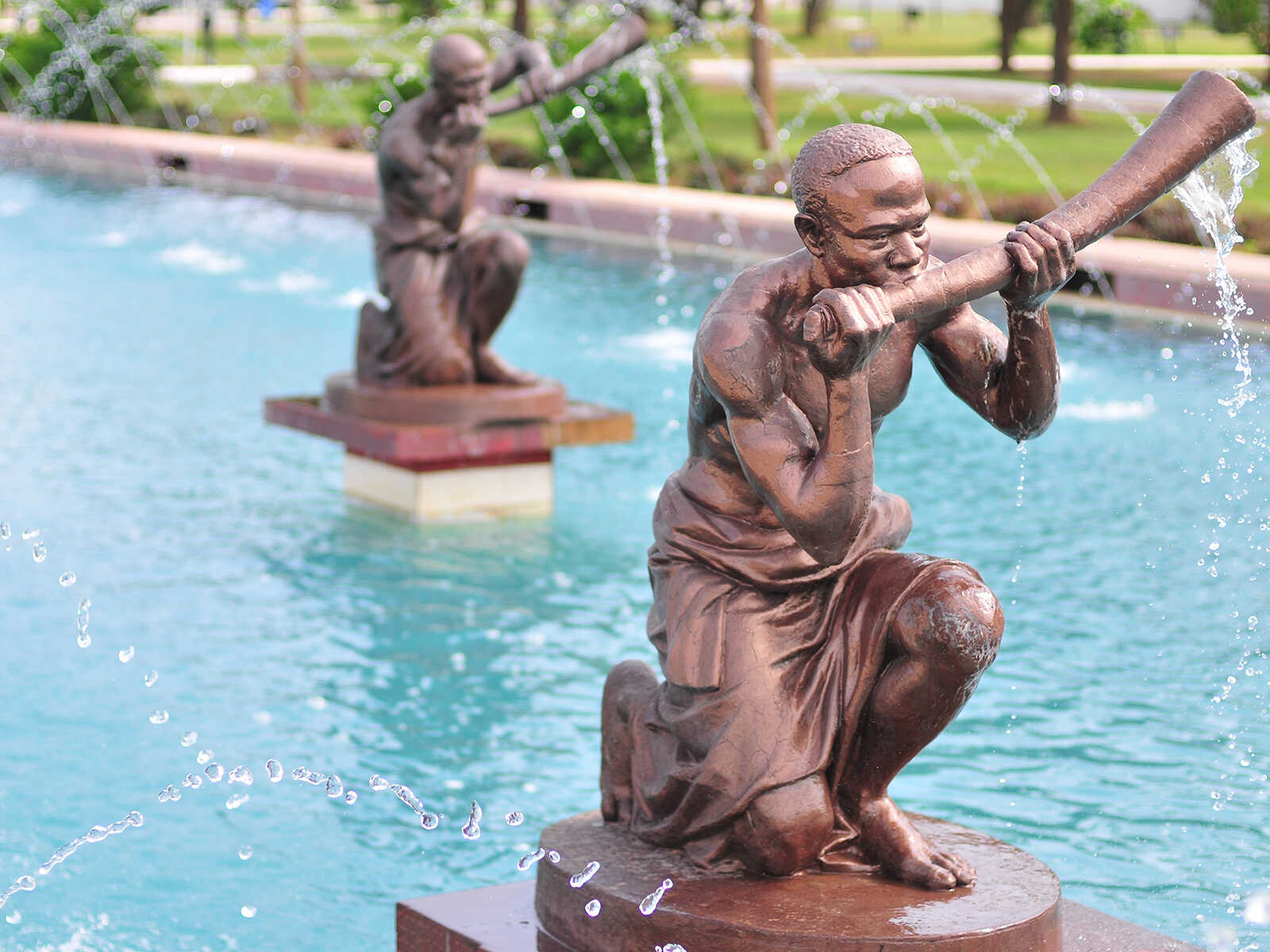
Kwame Nkrumah Memorial Park: A Monument to Independence
What is the Kwame Nkrumah Memorial Park and why was it established?
The Kwame Nkrumah Memorial Park, also known as the Kwame Nkrumah Mausoleum, is a national park in Accra, Ghana, dedicated to the memory of the first President of Ghana and a notable Pan-African leader, Dr. Kwame Nkrumah.
The park is located at the exact place where Nkrumah declared independence from British rule in 1957. The area, which once housed the colonial-era Old Polo Grounds, has been transformed into a beautiful park filled with a variety of plants and trees that symbolize the dawn of a new era.
At the center of the park stands the mausoleum, housing the remains of Kwame Nkrumah and his wife, Fathia Nkrumah. The mausoleum is an architectural masterpiece, designed by Don Aurthur, with a blend of Byzantine and traditional Ghanaian styles.
The park also features a museum, showcasing the life and work of Nkrumah. Exhibits include photographs, artifacts, and the personal effects of Nkrumah, providing a glimpse into his life as a leader, his international engagements, and his personal life.
The Kwame Nkrumah Memorial Park was established not just as a resting place for Nkrumah, but as a symbol of Ghana’s freedom. It is a tribute to the man who led Ghana to independence and sparked the wave of decolonization across Africa.
It also serves as a source of inspiration for future generations. The memorial park encourages Ghanaians to remember their roots, understand their history, and strive towards Nkrumah’s vision of a united and prosperous Africa.
Whether you’re a local Ghanaian or a tourist, a visit to the Kwame Nkrumah Memorial Park offers a rich historical and cultural experience. The park is not only a monument to independence but also a testament to the resilience and spirit of the Ghanaian people.
The Symbolism of the Kwame Nkrumah Memorial Park
How does the Kwame Nkrumah Memorial Park represent Nkrumah’s life and legacy?
The Kwame Nkrumah Memorial Park, beyond its role as a burial site and museum, is laden with symbolism that represents the life, achievements, and legacy of Kwame Nkrumah.
The mausoleum, where Nkrumah and his wife are laid to rest, is designed to symbolize unity. The upward-facing edges of the black star at the mausoleum’s top depict the enduring spirit of the Ghanaian people and their aspirations towards a brighter future.
The park’s layout holds significance as well. It is divided into five main sections, symbolizing the five different stages of Nkrumah’s life—his birth, childhood, adulthood, his time as a leader, and his eternal presence in Ghana’s history.
The museum’s collection helps visitors understand Nkrumah’s life and work better. Exhibits include personal items, photographs, and documents from his time in office, enabling visitors to appreciate the challenges he faced and the victories he achieved.
A statue of Nkrumah stands at the park, highlighting his leadership role. Interestingly, the statue’s position changes based on the political climate in Ghana – when sentiments towards Nkrumah are positive, the statue is erected, and when negative, it is taken down. This fluctuation symbolizes the changing perceptions of Nkrumah’s legacy over time.
Visitors to the park can’t miss the Eternal Flame of African Liberation, lit by Nkrumah at Ghana’s independence. This flame is a constant reminder of the struggles of African nations for liberation and the unity that Nkrumah envisaged for the continent.
In many ways, the Kwame Nkrumah Memorial Park acts as a living, breathing testament to the life and legacy of Nkrumah. Each element within the park, from its architecture to its exhibits, tells a story of a man who dared to dream of a free and united Africa. A visit to this significant site, akin to a journey through Ghana’s National Museum, helps to further contextualize Nkrumah’s contributions to Ghana and beyond.
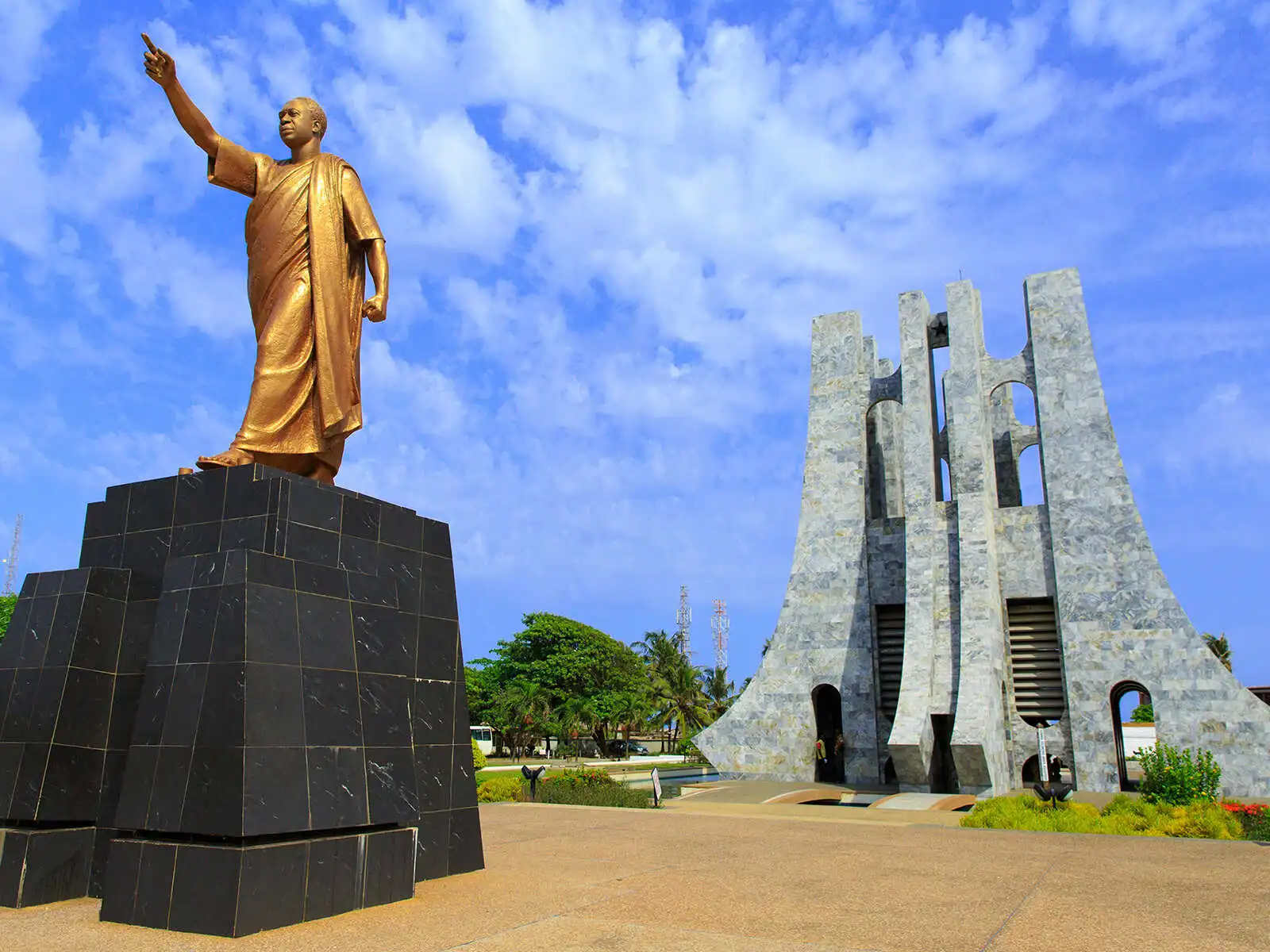
National Pride in Ghana: The Kwame Nkrumah Memorial Park
Why is the Kwame Nkrumah Memorial Park considered a place of national pride in Ghana?
The Kwame Nkrumah Memorial Park, beyond being a tribute to Ghana’s first President, is a symbol of the nation’s struggle for independence and its triumph over colonial rule. It stands as a monument to a new Ghana, free and capable of deciding its own fate.
The park is a physical representation of the historical moment when Nkrumah declared Ghana’s independence in 1957. This declaration, which took place on the site where the park now stands, marked a significant turning point in Ghana’s history and the beginning of a new era.
The park’s mausoleum houses the remains of Nkrumah and his wife, Fathia, further underscoring its importance. This final resting place is a symbol of the respect and admiration that the nation has for their leader.
Furthermore, the Kwame Nkrumah Memorial Park is a showcase of Ghanaian art and architecture. The design of the mausoleum, a blend of Byzantine and traditional Ghanaian styles, is an embodiment of the nation’s cultural heritage. It is a reminder of Ghana’s rich history and its resilience.
The park’s museum offers an educational experience, housing an extensive collection of personal effects and official documents from Nkrumah’s life and work. Visitors can learn about the struggles and victories that marked Ghana’s path to independence.
Finally, the park’s beautifully maintained green spaces, adorned with several statues and commemorative plaques, offer a serene environment for reflection. Here, Ghanaians can contemplate their country’s journey and the role they play in its future.
All these elements combine to make the Kwame Nkrumah Memorial Park a source of national pride. It stands as a reminder of Ghana’s past, a celebration of its present, and an inspiration for its future.
The Ideology of Pan-Africanism
How is Nkrumah’s Pan-Africanism ideology reflected in the Memorial Park and Mausoleum?
Kwame Nkrumah was a staunch advocate of Pan-Africanism, the ideology that all Africans, regardless of their location, share common interests and should be unified. His belief in this ideology is deeply reflected in the design and symbolism of the Kwame Nkrumah Memorial Park and Mausoleum.
The very establishment of the Memorial Park reflects this vision. By dedicating a significant landmark to Nkrumah, Ghana underscores the significance of a leader whose vision extended beyond national borders and encompassed the entire African continent.
The Eternal Flame of African Liberation, situated within the park, is a symbol of the unity and liberation that Nkrumah envisaged for Africa. This flame, lit by Nkrumah at Ghana’s independence, is a reminder of the struggles that African nations underwent for liberation and the potential unity that could be achieved.
The mausoleum’s architecture also symbolizes Nkrumah’s Pan-African vision. Its design, which includes traditional Ghanaian motifs blended with a Byzantine influence, signifies the unity of different cultures—much like Nkrumah’s dream of a united Africa.
The museum within the park holds several exhibits showcasing Nkrumah’s work towards African unity. This includes photographs, documents, and artifacts from key events such as the founding of the Organisation of African Unity (OAU), now known as the African Union (AU), a body aimed at promoting unity and cooperation among African states.
The location of the Memorial Park, in the heart of Accra, is also significant. It places Nkrumah’s Pan-African vision at the center of Ghana’s political and social life, continually reminding Ghanaians and visitors of his enduring dream of a united Africa.
Overall, the Kwame Nkrumah Memorial Park and Mausoleum is a monument that encapsulates Nkrumah’s Pan-African ideology, both in its physical representation and the ideals it stands for.
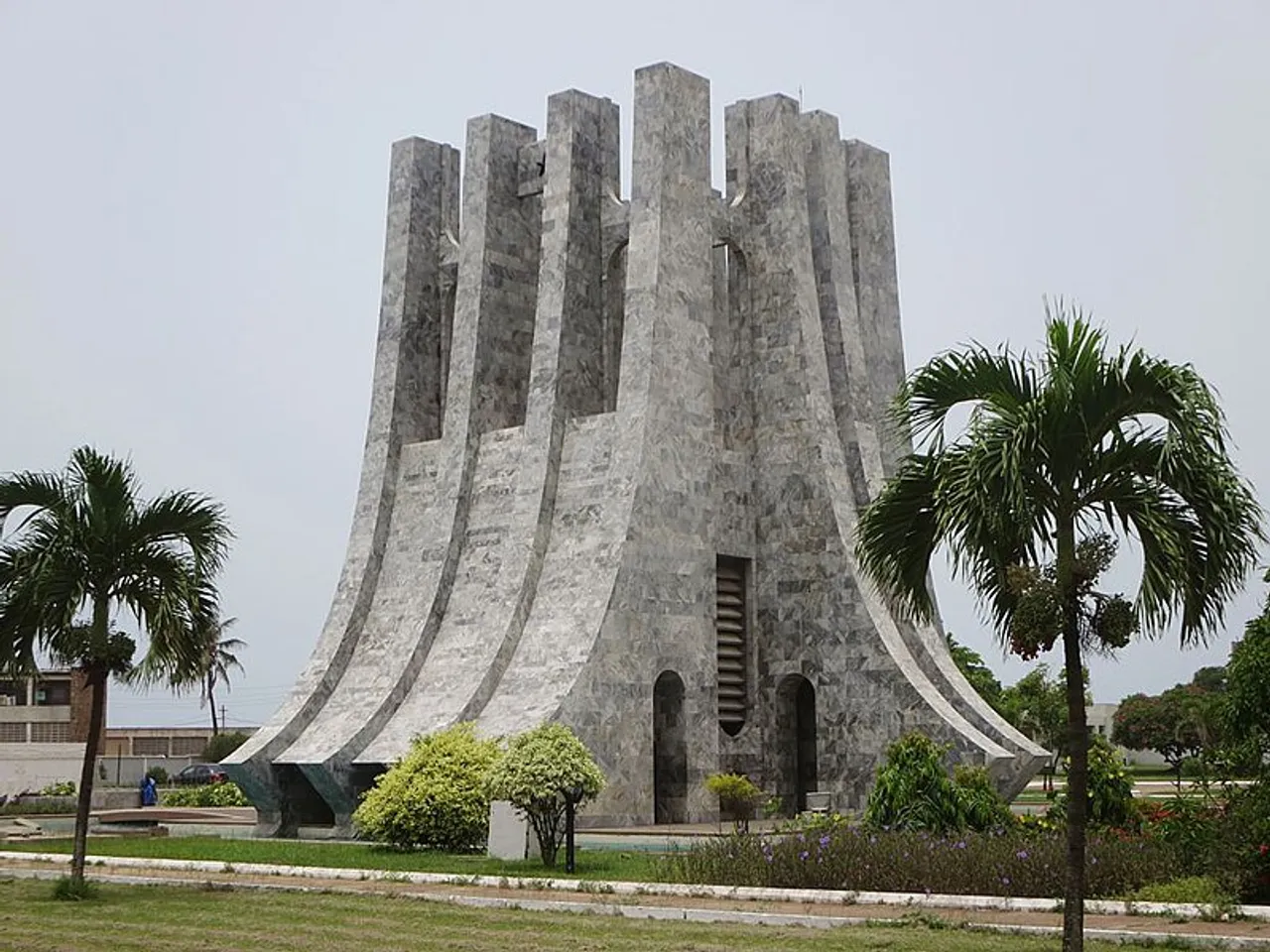
Modern Ghana: The Influence of Kwame Nkrumah’s Legacy
How has Kwame Nkrumah’s legacy influenced modern Ghana?
Kwame Nkrumah’s legacy has significantly influenced modern Ghana in various ways, from its political structure to its social and economic philosophies.
Nkrumah’s efforts led Ghana to become the first African country to gain independence from colonial rule, setting a precedent for other African nations. This achievement instilled a sense of nationalism and pride that continues to be a fundamental part of Ghanaian identity.
Politically, Nkrumah’s influence is evident in Ghana’s commitment to Pan-Africanism. His vision of a united Africa has shaped Ghana’s foreign policy and its relationship with other African nations. Ghana’s active role in the African Union and its commitment to regional integration are a testament to this.
Socially, Nkrumah’s emphasis on education has had a lasting impact. He believed in education as a tool for liberation and development, leading to the establishment of several educational institutions during his tenure, many of which continue to operate today.
Economically, Nkrumah’s push for industrialization laid the groundwork for modern Ghana’s economy. Despite facing criticism, his policies aimed to reduce dependence on colonial powers and build a self-sufficient economy.
Nkrumah’s philosophy of self-reliance and his promotion of Ghanaian culture have also significantly influenced the nation’s cultural identity and self-perception. His policies sought to strengthen Ghanaian cultural practices and traditions, many of which continue to thrive.
The Kwame Nkrumah Memorial Park is a living testament to Nkrumah’s enduring legacy. It serves as a reminder of his contributions and continues to inspire Ghanaians in their journey towards progress.
Commemorating Events at the Kwame Nkrumah Memorial Park
What events are commemorated at the Kwame Nkrumah Memorial Park?
The Kwame Nkrumah Memorial Park is not only a site of historical significance but also a venue for commemorating various national events. It stands as a reminder of Ghana’s history, its struggle for independence, and its journey since then.
One of the most significant events commemorated at the park is Ghana’s Independence Day on March 6. Every year, the park hosts various activities to celebrate the country’s independence, which Nkrumah declared on this site in 1957.
The park also commemorates Nkrumah’s birthday, recognized as Founder’s Day, on September 21. This national holiday is marked by events that reflect on Nkrumah’s contributions and the impact of his legacy on modern Ghana.
In addition to these annual events, the park is frequently used for cultural events, educational visits, and even official state functions. Performances showcasing Ghanaian music, dance, and other cultural practices are often held at the park, promoting local culture and history.
The Kwame Nkrumah Memorial Park is also a key site during the “Year of Return” – a government-led initiative inviting the global African diaspora to visit Ghana. The park’s historical significance makes it an essential stop for visitors seeking to connect with Ghana’s history and heritage.
In essence, the Kwame Nkrumah Memorial Park is more than a historical landmark or a tourist destination. It is a place of celebration, reflection, and education—a place where Ghana’s past and present come together to inspire its future. Visiting this site offers an enriched understanding of Ghana’s history, similar to exploring the collections of the National Museum of Ghana.

Education at the Kwame Nkrumah Memorial Park
What are the educational benefits of visiting the Kwame Nkrumah Memorial Park and Mausoleum?
Visiting the Kwame Nkrumah Memorial Park and Mausoleum offers numerous educational benefits. It provides a rich historical and cultural context that is critical for understanding Ghana and its evolution as a nation.
Firstly, the park gives insight into the life and work of Kwame Nkrumah. Visitors can explore the museum and observe various exhibits, including photographs, personal effects, and official documents, which offer a glimpse into Nkrumah’s life, leadership, and ideology.
The mausoleum, with its unique architectural style, serves as a lesson in Ghanaian art and architecture. Its blend of Byzantine and traditional Ghanaian styles is a testament to the country’s rich cultural heritage.
The park also offers a deeper understanding of the country’s struggle for independence and its path since then. It stands on the very spot where Nkrumah declared Ghana’s independence, making it a significant site for learning about this crucial period in the country’s history.
Furthermore, it provides a platform for exploring Pan-Africanism, a key ideology promoted by Nkrumah. The park’s monuments and symbols, such as the Eternal Flame of African Liberation, illuminate Nkrumah’s vision for a united and independent Africa.
Lastly, the park serves as a hub for various cultural and national events. These events offer visitors the chance to engage with Ghanaian culture and traditions, enhancing their understanding of the country’s vibrant cultural landscape.
Visiting the Kwame Nkrumah Memorial Park provides a holistic learning experience, similar to the kind offered by the National Museum of Ghana. It allows for an immersive exploration of Ghana’s history, culture, and its path towards the future.
The National Museum of Ghana: Unraveling Nkrumah’s Legacy
How does the National Museum of Ghana contribute to understanding Nkrumah’s legacy?
The National Museum of Ghana plays a crucial role in preserving and promoting Ghana’s history and cultural heritage. As such, it offers valuable insights into Kwame Nkrumah’s legacy and his impact on the country.
The museum houses a collection of historical artifacts, documents, and photographs from various periods in Ghana’s history, including the colonial era, the struggle for independence, and the post-independence era. These collections offer context to Nkrumah’s leadership and his influence on the country’s path towards independence.
Exhibits specifically dedicated to Nkrumah shed light on his life, political ideology, and his efforts towards national and Pan-African unity. They also delve into his personal life, providing a more holistic understanding of the man behind the political figure.
The museum’s collections on traditional Ghanaian art and culture further complement this understanding. Nkrumah had a strong focus on promoting Ghanaian culture as a form of national identity and self-expression, and these collections offer a glimpse into the cultural heritage he sought to uphold.
Educational programs and events hosted by the museum, such as lectures, workshops, and cultural performances, provide additional opportunities for learning. They create platforms for dialogue and discussion, encouraging visitors to engage more deeply with Ghana’s history and Nkrumah’s legacy.
In essence, the National Museum of Ghana plays a pivotal role in understanding Nkrumah’s legacy. Like the Kwame Nkrumah Memorial Park, it serves as a testament to Ghana’s past, a reflection of its present, and an inspiration for its future. The museum’s collections and programs invite visitors to delve deeper into the complexities of Ghana’s history and its journey as a nation.
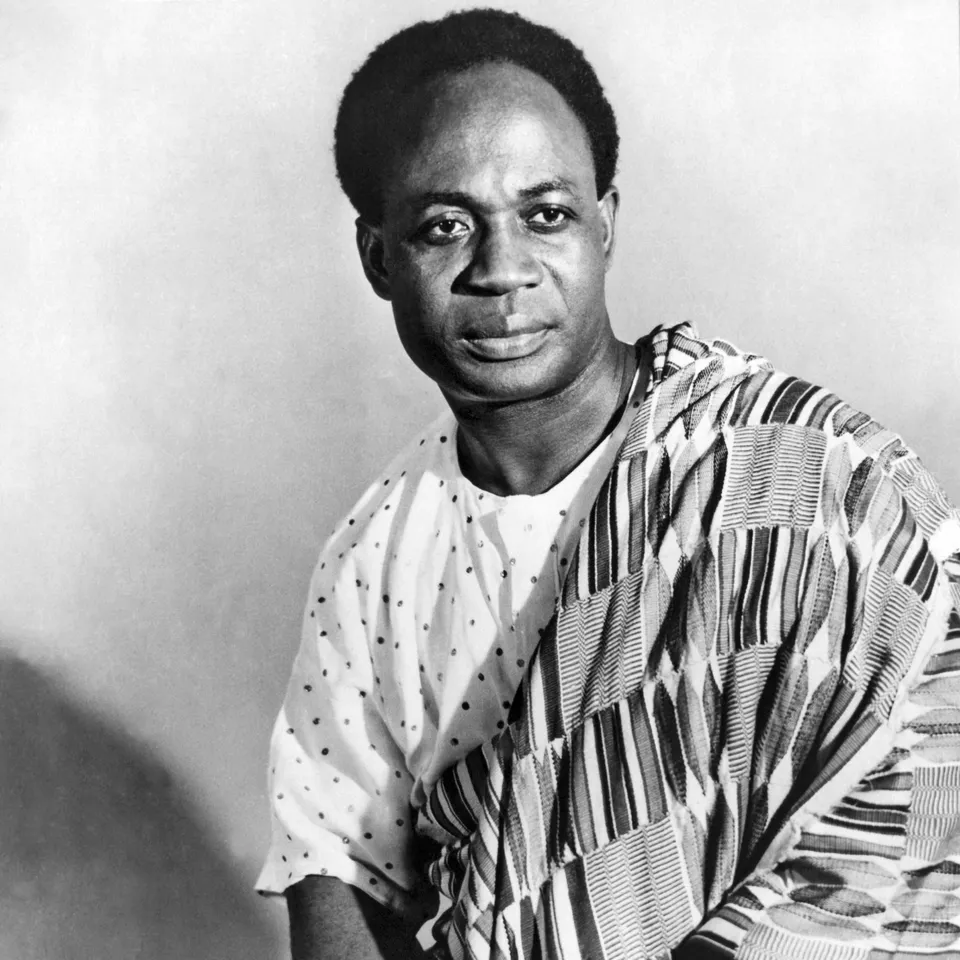
Nkrumah’s International Influence
How did Kwame Nkrumah’s vision and actions impact international relations and perceptions of Africa?
Kwame Nkrumah had a significant impact on international relations and perceptions of Africa, both during his time in office and beyond. His vision and actions have continued to influence the discourse on Africa’s role in the world.
Nkrumah was a staunch advocate for Pan-Africanism and believed in the unity and strength of African nations. His push for a united Africa altered the dynamics of international relations, leading to the formation of the Organization of African Unity (OAU), now the African Union. This organization plays a vital role in promoting Africa’s interests on the global stage.
His leadership in achieving Ghana’s independence marked a turning point in the decolonization process in Africa. Ghana’s independence inspired other African nations to seek their freedom, shifting the global perception of Africa from a continent of colonies to a continent of independent nations.
Nkrumah also championed non-alignment in the Cold War era, maintaining that newly independent African countries should remain neutral and not become entangled in superpower rivalries. This stance enhanced Africa’s voice and influence in international politics.
Furthermore, Nkrumah’s emphasis on education and industrialization painted a picture of an Africa capable of growth and self-sufficiency. His efforts to build a strong education system and a self-reliant economy in Ghana showed the world that African nations could progress beyond their colonial past and build prosperous futures.
Lastly, Nkrumah’s internationalist approach fostered strong relationships with other developing countries. His advocacy for South-South cooperation remains a significant aspect of international relations today.
While Nkrumah’s leadership faced various criticisms and challenges, there is no denying the impact he had on reshaping Africa’s image globally. The Kwame Nkrumah Memorial Park stands as a testament to his enduring influence, reminding visitors of his dreams for a united and prosperous Africa.
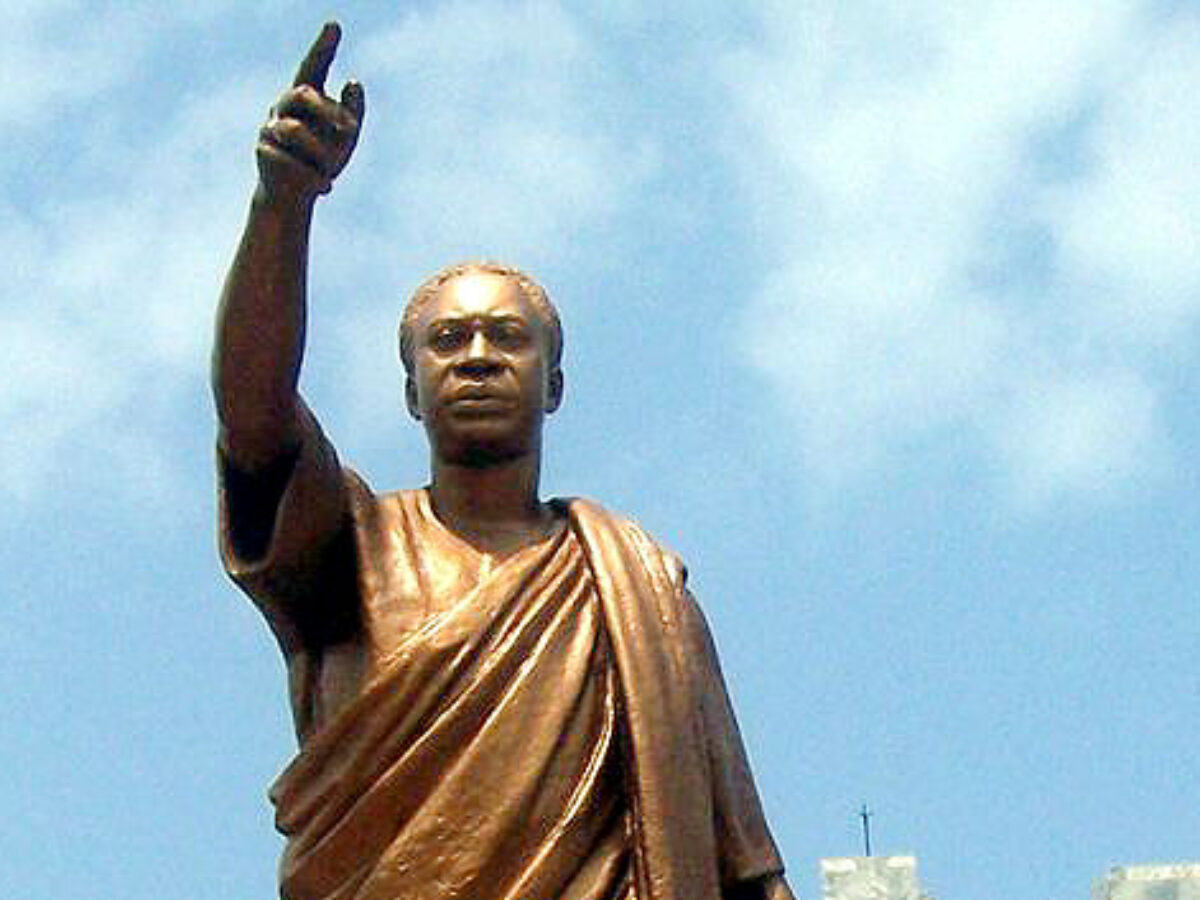
| Topics Discussed | Key Points |
|---|---|
| Kwame Nkrumah's Significance | First president of Ghana and a key figure in its journey to independence. Champion of Pan-Africanism and known for his anti-colonial stance. |
| The Kwame Nkrumah Memorial Park | A significant national park in Accra, Ghana, dedicated to Kwame Nkrumah. Houses a mausoleum, museum, and various symbolic monuments. |
| Symbolism of the Memorial Park | Represents different stages of Nkrumah's life and his ideologies, including Pan-Africanism. |
| The Memorial Park as a Source of National Pride | Reflects Ghana's struggle for independence and its cultural heritage. |
| Nkrumah's Pan-African Ideology | Reflected in the park's design and the Eternal Flame of African Liberation. |
| Influence on Modern Ghana | Contributions to Ghana's political, social, and economic landscape, and the promotion of Ghanaian culture. |
| Commemorated Events | Hosts significant national events like Independence Day and Founder's Day. Also serves as a venue for cultural events. |
| Educational Benefits | Offers insights into Nkrumah's life, Ghana's history, and the Pan-African ideology. |
| National Museum of Ghana | Houses collections and exhibits that contribute to understanding Nkrumah's legacy. |
| Nkrumah's International Influence | Advocacy for a united Africa, influence on decolonization, and impact on international relations. |
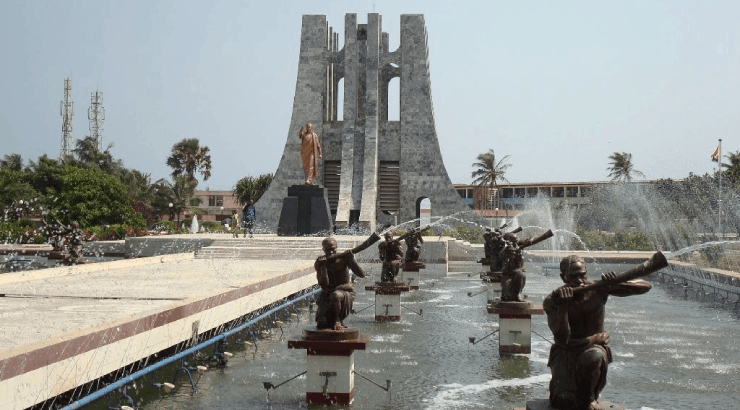
Frequently Asked Questions
Who was Kwame Nkrumah?
Kwame Nkrumah was the first President of Ghana and a key figure in its journey to independence. He was a staunch advocate for Pan-Africanism and is known for his anti-colonial stance.
What is the significance of the Kwame Nkrumah Memorial Park?
The Kwame Nkrumah Memorial Park is a significant national park in Accra, Ghana, dedicated to Kwame Nkrumah. It houses a mausoleum, a museum, and various symbolic monuments that represent different stages of Nkrumah’s life and ideologies, including Pan-Africanism.
Why is the Memorial Park considered a source of national pride?
The Memorial Park reflects Ghana’s struggle for independence, its triumph over colonial rule, and its rich cultural heritage. It stands as a monument to a new Ghana, free and capable of deciding its own fate.
How is Nkrumah’s Pan-African ideology reflected in the Memorial Park?
Nkrumah’s Pan-African ideology is deeply reflected in the park’s design and symbols, including the Eternal Flame of African Liberation. The park itself is a testament to Nkrumah’s vision of a united Africa.
How has Nkrumah influenced modern Ghana?
Nkrumah’s leadership has significantly shaped Ghana’s political, social, and economic landscape. His contributions to education, his push for industrialization, and his promotion of Ghanaian culture have left a lasting impact on the country.
What events are commemorated at the Memorial Park?
The Memorial Park hosts significant national events like Independence Day and Founder’s Day, and it also serves as a venue for cultural events and celebrations.
How does the National Museum of Ghana contribute to understanding Nkrumah’s legacy?
The National Museum of Ghana houses collections and exhibits that offer valuable insights into Nkrumah’s life, his work, and his impact on Ghana and Africa. It plays a crucial role in preserving and promoting Ghana’s history and cultural heritage.

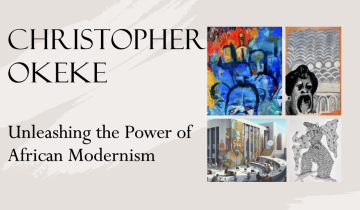

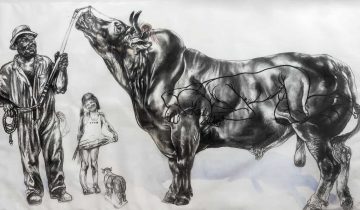
 No products in the basket.
No products in the basket.